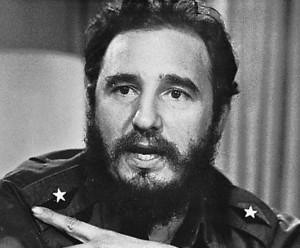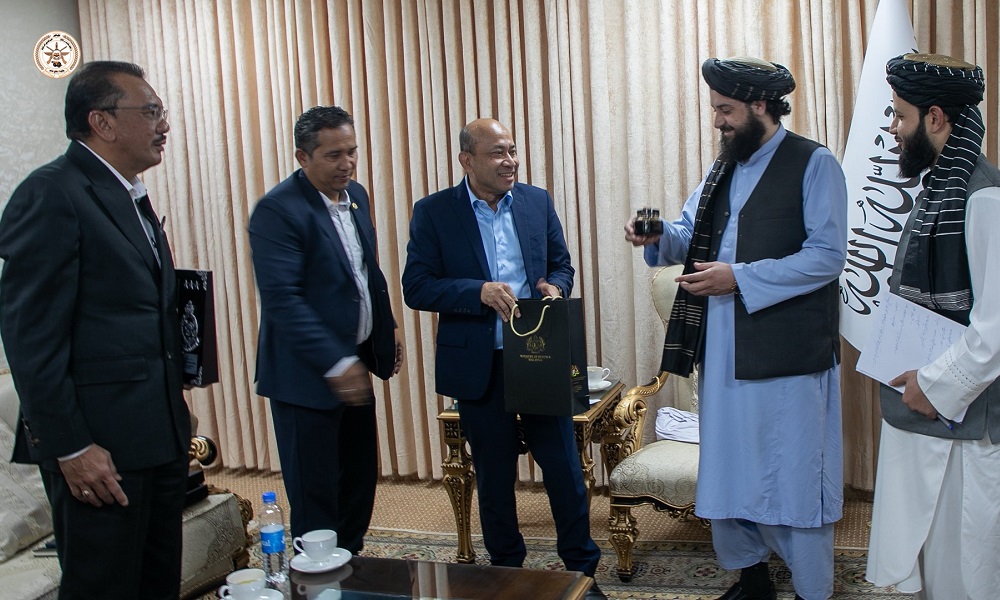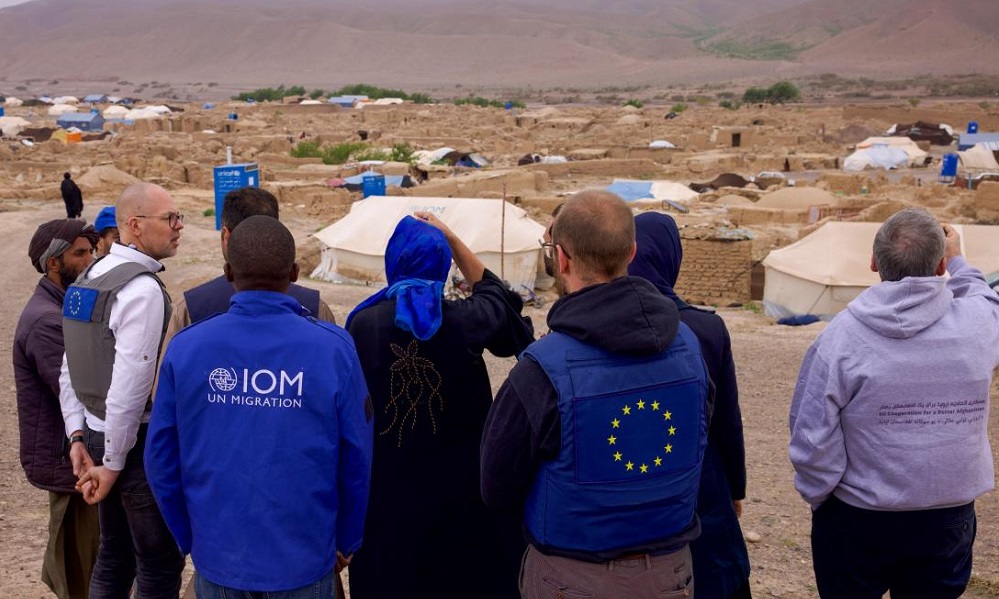Latest News
Cuban Revolutionary Fidel Castro Dies at 90

 Guerrilla revolutionary and communist idol, Fidel Castro was a holdout against history who turned tiny Cuba into a thorn in the paw of the mighty capitalist United States.
Guerrilla revolutionary and communist idol, Fidel Castro was a holdout against history who turned tiny Cuba into a thorn in the paw of the mighty capitalist United States.
The former Cuban president, who died aged 90 on Friday, said he would never retire from politics.
But emergency intestinal surgery in July 2006 drove him to hand power to Raul Castro, who ended his brother’s antagonistic approach to Washington, shocking the world in December 2014 in announcing a rapprochement with US President Barack Obama.
Famed for his rumpled olive fatigues, straggly beard and the cigars he reluctantly gave up for health reasons, Fidel Castro kept a tight clamp on dissent at home while defining himself abroad with his defiance of Washington.
In the end, he essentially won the political staring game, even if the Cuban people do continue to live in poverty and the once-touted revolution he led has lost its shine.
As he renewed diplomatic ties, Obama acknowledged that decades of US sanctions had failed to bring down the regime — a drive designed to introduce democracy and foster western-style economic reforms — and it was time to try another way to help the Cuban people.
A great survivor and a firebrand, if windy orator, Castro dodged all his enemies could throw at him in nearly half a century in power, including assassination plots, a US-backed invasion bid, and tough US economic sanctions.
Born August 13, 1926 to a prosperous Spanish immigrant landowner and a Cuban mother who was the family housekeeper, young Castro was a quick study and a baseball fanatic who dreamed of a golden future playing in the US big leagues.
But his young man’s dreams evolved not in sports but politics. He went on to form the guerrilla opposition to the US-backed government of Fulgencio Batista, who seized power in a 1952 coup.
That involvement netted the young Fidel Castro two years in jail, and he subsequently went into exile to sow the seeds of a revolt, launched in earnest on December 2, 1956 when he and his band of followers landed in southeastern Cuba on the ship Granma.
Twenty-five months later, against great odds, they ousted Batista and Castro was named prime minister.
-Lawyer turned fighter-
Once in undisputed power, Castro, a Jesuit-schooled lawyer, aligned himself with the Soviet Union. And the Cold War Eastern Bloc bankrolled his tropi-communism until the Soviet bloc’s own collapse in 1989.
Fidel Castro held onto power as 11 US presidents took office and each after the other sought to pressure his regime over the decades following his 1959 revolution, which closed a long era of Washington’s dominance over Cuba dating to the 1989 Spanish-American War.
And Castro’s dangerous liaison with the Soviet Union took the world to the nerve-jarring edge of nuclear war in the 1962 Cuban Missile Crisis. It was sparked when Moscow sought to position nuclear-tipped missiles on the island just 144 kilometers (90 miles) off the US state of Florida.
After a tense standoff between the rival superpowers, the world pulled back from the abyss as Moscow agreed to keep the missiles off Cuban soil.
Castro strode the world stage as a communist icon when the Cold War was at its height.
He sent 15,000 soldiers to help Soviet-backed troops in Angola in 1975 and dispatched forces to Ethiopia in 1977.
The United States has variously been infuriated, embarrassed and alarmed at Castro’s defiance, and intensely frustrated by his survival in power despite the economic embargo Washington hoped in vain would spark rebellion.
The tempestuous Cuban president himself repeatedly pinned the blame for Cubans’ economic hardship on the embargo. The United States had invaded the island nation before, he reminded his 11 million people constantly, and could do so again at any time.
After a cutoff of Soviet bloc aid in 1989 nearly collapsed the economy, Castro allowed more international tourism and slight economic reform on the Caribbean’s largest island.
But as even China loosened economic reins, Havana backtracked and held tight to the centralized economic model. Instead, a new ally, Hugo Chavez, president of oil-rich Venezuela and also a foe of Washington, began bankrolling Castro’s regime.
– They called him ‘Fidel’-
Known widely among Cubans as simply “Fidel” or “El Comandante,” Castro broke off diplomatic ties with the United States in 1961 and expropriated US companies’ assets totaling more than one billion dollars.
In April 1961 he weathered an invasion attempt by some 1,300 CIA-trained Cuban exiles at the Bay of Pigs.
But the island suffered from an exodus of people and capital abroad, mainly to Florida where a large anti-Castro movement thrived.
Castro kept his private life largely private, but in recent years, more details became public.
In 1948, he married Mirta Diaz-Balart, who gave birth to their first son, Fidelito. The couple later divorced.
In 1952, Castro met Naty Revuelta, a socialite married to a doctor, and they had a daughter, Alina, in 1956.
He met Celia Sanchez, said to have been his main life partner, in 1957 and remained with her until her death in 1980.
In the 1980s, Castro reportedly married Dalia Soto del Valle, with whom he had five children: Angel, Antonio, Alejandro, Alexis and Alex.
After stepping aside in 2006, Fidel Castro recovered slowly from surgery and kept rallying on the sidelines to push his Revolution into the 21st century. It made it, in decidedly rough shape.
President Raul Castro, the former defense chief who is now (born June 3, 1931) himself, in the past few years kept dissent largely in check and economic reform limited, with the island’s economy in very dire straits.
Written by: AFP

Latest News
Tripartite trade meeting held in Kabul to boost regional connectivity

A tripartite meeting between the delegations of Afghanistan, Turkmenistan and Kazakhstan was held in Kabul with the aim of connecting North Asia to South Asia and reducing transit and transportation costs among these three countries, the Ministry of Trade and Commerce said in a statement.
In this meeting, an agreement was reached on the creation of a joint technical committee to continue the talks.
This tripartite meeting was held under the leadership of Nooruddin Azizi, the Acting Minister of Industry and Commerce, Vice President of Turkmenistan and Srik Zhumangarin, the Deputy Prime Minister of Kazakhstan.
Earlier, a bilateral meeting was held between the delegation of the Islamic Emirate and Turkmenistan. The ministry of commerce said the participants of the meeting discussed the construction of a large joint logistics center in Torghondi, the trilateral transit agreement between the IEA, Turkmenistan, and Kazakhstan, the expansion of Afghanistan’s railway, solving issues related to Afghan transit and export goods, and a number of other commercial issues.
Latest News
No destructive groups including Daesh present in Afghanistan: Yaqub Mujahid

Acting Minister of National Defense Mohammad Yaqub Mujahid has said that no destructive groups including Daesh have physical presence in Afghanistan, adding the Islamic Emirate of Afghanistan (IEA) will not allow anyone to pose threat to any country in the region from the Afghan soil.
Mujahid made the remarks in a meeting with a delegation from Malaysia in Kabul on Thursday.
According to a statement released by the Ministry of Defense, Mujahid highlighted Malaysia’s “good treatment” of Afghan refugees and its long-standing relations with Afghanistan, and said that Malaysia is a powerful Islamic country and visits should increase.
He added that with the establishment of the Islamic Emirate, occupation and war ended in Afghanistan, and the country is fully secure.
Based on the statement, the Malaysian delegation called Afghanistan a friendly country and while emphasizing on comprehensive cooperation, it assured that what they have seen in Afghanistan will be shared with the authorities of their country.
Latest News
EU allocates 17 million euros to support Afghans on the move

The European Union signed an agreement worth 17 million euros with the International Organization for Migration (IOM) to improve access to basic services, increased economic opportunities and protection for Afghans on the move and their host communities in Afghanistan.
The needs of women and girls are a particular focus of the programme, EU said in a statement released on Thursday.
The statement noted that from January 2023 until April 2024, over 1.5 million Afghans returned from Pakistan and Iran.
“I am deeply moved by the hardship returnees face when being deported to Afghanistan. In a country suffering from poverty and climate change, and in a city that just saw devastating earthquakes, this truly is a crisis within a crisis.”, said Peteris Ustubs, Director for the Middle East, Asia and Pacific of the European Commission’s Department for International Partnerships during the signing ceremony at the IOM transit centre in Herat.
Raffaella Iodice, EU Chargée d’Affaires a.i. to Afghanistan, added “The solidarity of the Afghan people towards their brothers and sisters is an inspiration. We must assure that communities hosting and helping new arrivals are supported. The partnership with IOM ensures access to essential services and provides protection for Afghan returnees and their host communities. As women and girls can be particularly affected, we make sure that all members of society can benefit”.
“IOM’s continued partnership with the EU has been critical in enabling our teams to reach hundreds of thousands of Afghan returnees and other vulnerable communities in the country”, said IOM Afghanistan Chief of Mission, Maria Moita. “Thanks to this renewed commitment, we will be able to focus on addressing the immense challenges in the areas of return and contribute to reintegration, social cohesion, and longer-term solutions for those communities.”
This additional contribution is part of a 5-year programme that is being implemented across Afghanistan and in four countries in the region. It builds on the EU’s previous support to IOM to improve the wellbeing of Afghans forced to return to the country, EU said.
-

 Latest News4 days ago
Latest News4 days agoRashid Khan named AWCC’s brand ambassador
-

 Regional5 days ago
Regional5 days agoIranian president lands in Pakistan for three-day visit to mend ties
-

 Sport5 days ago
Sport5 days agoKolkata beat Bengaluru by one run in IPL as Kohli fumes at dismissal
-

 Sport5 days ago
Sport5 days agoACL: Aino Mina 3-0 Istiqlal Kabul; Attack Energy 3-0 Khadim
-

 Climate Change5 days ago
Climate Change5 days agoRescuers race to reach those trapped by floods in China’s Guangdong
-

 World4 days ago
World4 days agoMalaysian navy helicopters collide in mid-air, 10 killed
-

 Sport4 days ago
Sport4 days agoJaiswal ton powers Rajasthan to big IPL win
-

 Sport4 days ago
Sport4 days agoMawj Sahil player scores stunning halfway line goal in 1-0 win over Jawanan Wahedi















